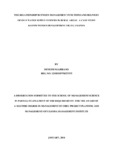| dc.description.abstract | The study examined the relationship between management functions and delivery of self water supply systems in Katosi Mukono District. This research was prompted by the shortage of clean water in Katosi, Mukono District. The study was guided under these specific objectives; to examine the relationship between planning, organizing, controlling and delivery of self water supply systems. A descriptive cross sectional survey design was employed because it enhances data collection at a single point in time. The inter-item consistency reliability using alpha Cronbach test was tested. Data was collected from 92 respondents was both qualitatively and quantitatively collected and analyzed. The study findings were; a positive and statistically significant relationship between planning, organizing and controlling vis-à-vis self water supply systems. The outstanding conclusions were; planning process was participatory, construction work was taken care of and remuneration of the technocrats was contested and the community was involved in ensuring safety of the money they collect. Underlying organizing, there was a framework within which efforts were coordinated to ensure a chain of command, had qualified and experienced personnel. As regards controlling decision making was left under the management team, there was a mechanism for ensuring proper monitoring and evaluation and had in place a medium of giving feedback to the people concerned and record keeping. The study recommended from the conclusions on planning that participatory planning should be upheld and should be bottom up approach. For sustainable development local people should be sensitized to so as to contribute generously to the project and gender balance should be taken care of much as its women founded organization. On budgeting, involvement of the community should be upheld. On organizing, the chain of command should be upheld, recruitment of qualified and experienced employees be upheld, sensitize the locals to know the importance of local contributions towards their projects and remuneration should be revised to enable employees to get both allowances and salaries for work well done. Lastly on controlling, the researcher recommended that decision before their implementation all stakeholders should be consulted, the system of monitoring and evaluation should be upheld and people concerned in sensitive positions should train through short courses and on documentation the persons concerned should have an ongoing training in records management and storage and documentation. | en_US |

